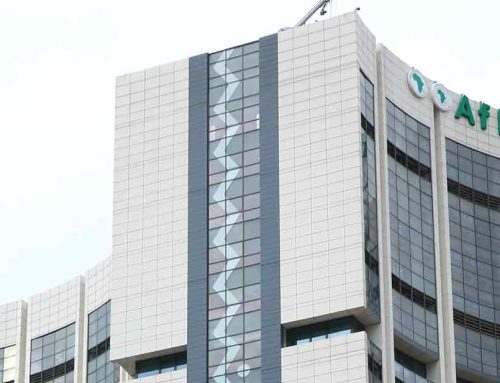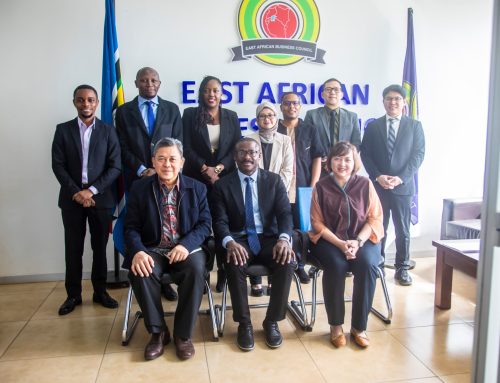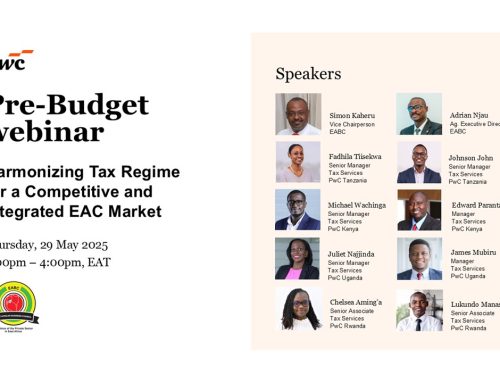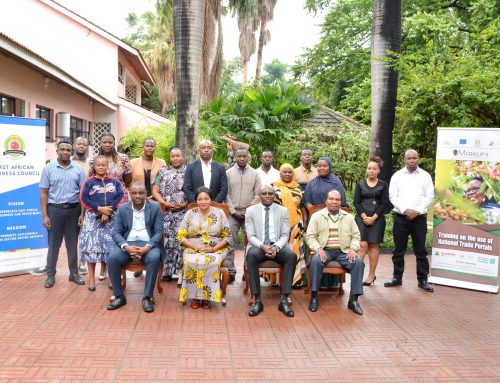Thursday, 30th September 2021 Arusha, Tanzania: – The intra-EAC trade drop by 5.5% to USD. 5.9 billion in 2020 due to COVID-19 while exports from the bloc to the world hit 16.2 billion in 2020 a 3% boost in comparison to 2019. This was highlighted during the Webinar on EAC Trade & Investment Recovery amidst COVID-19 organized by the East African Business Council.
In his opening remarks, Mr. John Bosco Kalisa, EABC CEO said, “the private sector and buy East African, build East Africa campaign is central in driving the economic recovery agenda for the EAC bloc amid COVID-19.” He elaborated that EABC in partnership with African Economic Research Consortium (AERC) and Bill & Melinda Gates Foundation (BMGF) conducted COVID-19 impact studies to inform policies in order to ignite the rebound and recovery of Manufacturing, Tourism& Hospitality, Agriculture & Food Security, and Transport & Logistics sectors in the EAC bloc.
In his remarks, the Director of Trade at the EAC Secretariat, Alhajj Rashid Kibowa said the EAC Post COVID-19 economic recovery plan is under country consultation. He further said the pandemic impacted trade performance noting that EAC import declined to 3.56 billion in 2020 from 3.95 billion in 2019.
Director Kibowa stated that Foreign Direct Investments (FDI) in the EAC dropped by 43% to USD. 4.9 billion in 2020 and jobs declined by 2%, wiping out the gains made in previous year. In 2019 EAC bloc recorded USD. 8.66 billion FDI a 375% rise from 2018.
Director Kibowa stated that the EAC Secretariat embarked on digitalization & harmonization of COVID-19 procedures to ease movement of cargo and holds regular consultations with the Ministries of Health, Finance and Trade to monitor & gauge the social and economic impact of COVID-19 in order for the EAC bloc to move in unison.
Mr. Kibowa said the EAC Post COVID-19 economic recovery plan sets out key strategies namely: Attracting investment in ICT manufacturing & health; Incentives for promotion of regional value chains; Diaspora investments; Innovation centers; Elimination of Non-Tariff Barriers; SMEs promotion; access to new Tripartite Free Trade Area (TFTA) and African Continental Free Trade Area (AfCFTA) markets; Export promotion; E-commerce & digitalization of trade; Harmonization of standards; Trade facilitation for cargo clearance and boosting services trade.
Speaking at the webinar, Mr. Alex Njombe Senior Partner at KPMG Tanzania said that vaccination is important to reduce the negative impact of COVID-19. He urged East African companies to adopt digital technology to build enterprise resilience in the new norm supporting simulations to predict future risks and opportunities on finances & liquidity, operations, supply chain, commerce and macro-perspectives of the economy.
Mr. Njombe said in the second phase of COVID-19 businesses triggered continuity plans to boost resilience as the GDP growth and capital markets decline and credit risk rose due to the impact of the pandemic. He further elaborated that the third phase of COVID-19, ushered in recovery with more capital projects, import substitution of disrupted supply and businesses tapped into new opportunities.
On her part, Ms. Kudzai Madzivanyika, E.A Senior Manager-Regional Policy and Trade USAID Policy LINK Project urged the EAC Partner State to implement the 10% financial budget requirement for the agricultural sector in line with the Comprehensive Africa Agriculture Development.
She said the COVID-19 affected the marketing and storage of agricultural products, disrupted supply chains leading to access to agricultural input, labour and price volatilities. She said the competitiveness of the agricultural sector in the EAC bloc is hindered by low productivity, trade barriers, import bans, Sanitary and Phytosanitary Measures (SPS) high taxes, transport, inadequate warehousing and storage facilities.
She urged for evaluation and monitoring of policies and plans, putting in place safety nets, elimination of trade restrictions & NTBs, trade facilitation for foods, perishables & agri-products, diversification and increasing production capacities and integration of regional value chains. Ms. Madzivanyika, said the AfCFTA should address Africa’s USD.100 billion food import bill projected in 2030.
The Chair of National Logistics Platform, Dr. Meriam Sebunya, said “the competitiveness of EAC businesses and economies hinges on the transport & logistics sector.” She stated that for quick recovery, the EAC bloc should reduce the cost of doing business and deliberately address the root causes of NTBs, high levies and fees in the transport and logistic sector as it contributes to more than 30% of the cost of production.
Dr. Meriam Sebunya urged EAC Partner States to fast-track the improvement of multimodal transport systems such as rail and water for the bloc to be competitive in light of the AfCFTA. She also called for public-private dialogue to resolve NTBs in order to ease and improve the competitiveness of exports from the EAC bloc to the continent.
On his part, Mr. Yves Ngenzi, Regional Coordinator, East Africa Tourism Platform, said, tourism nearly came to a standstill due to COVID-19. He stated that the EA region has gaps in COVID-19 protocols evidenced by the different testing fees and the validity period of COVID-19 test results for travelers.
Mr. Ngenzi urged all EAC Partner State to sign up for the Single African Air Transport Market protocol to reduce the cost of air transport. He called for innovation & diversification to new services such as sports tourism & MICE and marketing the EAC bloc as a single tourist destination. He elaborated that the East African Tourism Platform rolled out Tembea Nyumbani campaign to boost domestic and regional tourism. He further said open skies, vaccination, harmonization of COVID-19 protocols, tax incentives, easing of COVID-19 restrictions and stimulus packages will improve the resilience and recovery of the hospitality & tourism sector.
Mr. Muzamil Muhammad Policy Analyst of Uganda Manufacturers Association said the COVID-19 disrupted access to raw materials. He urged for mutual recognition & harmonization of standards, streamlining of transport & logistics, local content for public procurement, strengthening of regional supply chains, improving access to long-term capital, managing national debt, provision of incentives to industries in order to boost the resilience and recovery manufacturing sector. He also urged EAC to formulate COVID-19 pandemic manufacturing transitionally policy.
On her part, Mrs. Mary Ngechu, EABC Board Director shared insights on the impact of COVID-19 on SMEs. She explained that the EAC Partner States introduced deferral of tax, debt payments, review of interest rates and sector-specific cushioning funds to ease liquidity constraints for SMEs. She cited that Kenya proposed a 100% tax relief for ‘’Low-income earners”, Uganda rolled out Support to Agricultural Revitalization and Transformation (START) Facility Management and Rwanda introduced USD 200 million fund to support access to capital for SMEs.
“Simplifying the provision of loan guarantees enables commercial banks to expand lending to SMEs,” said Mrs. Mary Ngechu.
On e-commerce, Mrs. Ngechu said, “EAC should harmonize and implement e-commerce & cross-border payment systems policies, legislation, and regulation.”
She elaborated that poor enforcement of consumer protection regulations, low access to electronic transaction frameworks, complex cross-border administrative procedures and unharmonized customs rules, high costs of delivery services, absence of a mechanism to address digital goods and data localization procedures set back the e-commerce in the region.
Issued by:
Mr. John Bosco Kalisa
Executive Director/ CEO
East African Business Council (EABC)
9th Floor Mafao House | Old Moshi Road | Arusha | Tanzania
P. O. Box 2617 | Tel: +255 27 2520162
Email: director@eabc-online.com I Website: eabc.info
EABC – The Voice of the Private Sector in East Africa
About East African Business Council: The East African Business Council (EABC) is the regional apex body of private sector associations and Corporates from the 6 East African countries. It was established in 1997 to foster the interests of the private sector in the integration process of the East African Community. EABC vision is a borderless East Africa for business and investment. The primary mission is to promote sustainable private sector- driven growth in the EAC.





